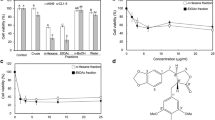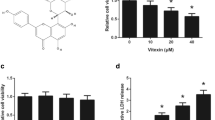Abstract
The purpose of this research was to investigate whether or not avicularin (AVL) possesses any anticancer properties when tested against lung cancer. In the beginning, the effect that it had on the cellular viability of A549 cells was investigated, and it was discovered that AVL has a considerable negative impact on cellular viability. Following that, an investigation using flow cytometry was carried out to investigate its function in the process of apoptosis and the cell cycle of A549 cells. It has been discovered that AVL significantly promotes apoptosis and stops the cell cycle at the G2/M phase. The colony-forming capacity of A549 cells was observed to be greatly suppressed as the AVL concentration increased compared to the group that received no treatment. In addition to this, the benzo(a)pyrene in vivo model was established in order to investigate the pharmacological value of AVL. The findings revealed that AVL greatly prevented the formation of pro-inflammatory cytokines, in addition to the reduction in oxidative stress, which was evidenced by a reduction in the concentration of TNF-α, IL-1β, IL-6, and MDA with an improvement in the concentration of SOD and GPx, respectively. Our results successfully demonstrated the pharmacological benefit of avicularin against lung cancer, and it has been suggested that it showed a multifactorial effect.





Similar content being viewed by others
Data Availability
The data that support the findings of this study are available from the corresponding author upon reasonable request.
References
Ahmad A, Ansari IA (2021) Carvacrol exhibits chemopreventive potential against cervical cancer cells via caspase-dependent apoptosis and abrogation of cell cycle progression. Anticancer Agents Med Chem 21:2224–2235. https://doi.org/10.2174/1871520621999201230201258
Al-Maharik N (2019) Isolation of naturally occurring novel isoflavonoids: an update. Nat Prod Rep 36:1156–1195. https://doi.org/10.1039/c8np00069g
Anandakumar P, Kamaraj S, Ramakrishnan G et al (2009) Chemopreventive task of capsaicin against Benzo(a)pyrene-induced lung cancer in Swiss albino mice. Basic Clin Pharmacol Toxicol 104:360. https://doi.org/10.1111/j.1742-7843.2009.00387.x
Bai X, Tang J (2020) Myrcene exhibits antitumor activity against lung cancer cells by inducing oxidative stress and apoptosis mechanisms. Nat Prod Commun 15:1934578X20961189. https://doi.org/10.1177/1934578X20961189
Butler MS, Robertson AAB, Cooper MA (2014) Natural product and natural product derived drugs in clinical trials. Nat Prod Rep 31:1612–1661
Chen W, Zhang H, Liu Y (2019) Anti-inflammatory and apoptotic signaling effect of fucoxanthin on benzo(A)pyrene-induced lung cancer in mice. J Environ Pathol Toxicol Oncol 38:239–251. https://doi.org/10.1615/JEnvironPatholToxicolOncol.2019030301
Foster I (2008) Cancer: a cell cycle defect. Radiography 14:144
Go YY, Kim SR, Kim DY et al (2020) Cannabidiol enhances cytotoxicity of anti-cancer drugs in human head and neck squamous cell carcinoma. Sci Rep 10:20622. https://doi.org/10.1038/s41598-020-77674-y
Hu X, Geetha RV, Surapaneni KM et al (2021) Lung cancer induced by benzo(a)pyrene: chemoprotective effect of sinapic acid in Swiss albino mice. Saudi J Biol Sci 28:7125. https://doi.org/10.1016/j.sjbs.2021.08.001
Kashyap D, Garg VK, Tuli HS et al (2019) Fisetin and quercetin: promising flavonoids with chemopreventive potential. Biomolecules 9:174. https://doi.org/10.3390/biom9050174
Kopustinskiene DM, Jakstas V, Savickas A, Bernatoniene J (2020) Flavonoids as anticancer agents. Nutrients 12:457
Lee G, Walser TC, Dubinett SM (2009) Chronic inflammation, chronic obstructive pulmonary disease, and lung cancer. Curr Opin Pulm Med 15:303
Li X, Tang Q, Meng F et al (2022) INPUT: an intelligent network pharmacology platform unique for traditional Chinese medicine. Comput Struct Biotechnol J 20:1345. https://doi.org/10.1016/j.csbj.2022.03.006
Ling ZZ, Hui SM, Feng YW et al (2021) Avicularin suppresses cartilage extracellular matrix degradation and inflammation via TRAF6/MAPK activation. Phytomedicine 91:153657. https://doi.org/10.1016/j.phymed.2021.153657
Ma D, Wang S, Shi Y et al (2021) The development of traditional Chinese medicine. J Trad Chin Med Sci 8:S1. https://doi.org/10.1016/j.jtcms.2021.11.002
Matsui T, Nuryadi E, Komatsu S et al (2019) Robustness of clonogenic assays as a biomarker for cancer cell radiosensitivity. Int J Mol Sci 20:4148
Mithoowani H, Febbraro M (2022) Non-small-cell lung cancer in 2022: a review for general practitioners in oncology. Current Oncology 29:1828
Mohammad RM, Muqbil I, Lowe L et al (2015) Broad targeting of resistance to apoptosis in cancer. Semin Cancer Biol 35:S78–S103
Nan J, Hu H, Sun Y et al (2017) TNFR2 stimulation promotes mitochondrial fusion via Stat3- and NF-kB-dependent activation of OPA1 expression. Circ Res 121:392–410. https://doi.org/10.1161/CIRCRESAHA.117.311143
Nuryadi E, Permata TBM, Komatsu S et al (2018) Inter-assay precision of clonogenic assays for radiosensitivity in cancer cell line A549. Oncotarget 9:13706. https://doi.org/10.18632/oncotarget.24448
Oh ST, Lee S, Hua C et al (2019) Decursin induces apoptosis in glioblastoma cells, but not in glial cells via a mitochondria-related caspase pathway. Korean J Physiol Pharmacol 23:29–35. https://doi.org/10.4196/kjpp.2019.23.1.29
Panche AN, Diwan AD, Chandra SR (2016) Flavonoids: an overview. J Nutr Sci 5:e47. https://doi.org/10.1017/jns.2016.41
Qian S, Fang Y, Yao C et al (2022) The synergistic effects of PRDX5 and Nrf2 on lung cancer progression and drug resistance under oxidative stress in the zebrafish models. Oncol Res 30:53. https://doi.org/10.32604/or.2022.026302
Samant NP, Gupta GL (2022) Avicularin attenuates memory impairment in rats with amyloid beta-induced Alzheimer’s disease. Neurotox Res 40:140. https://doi.org/10.1007/s12640-021-00467-2
Sosa V, Moliné T, Somoza R et al (2013) Oxidative stress and cancer: an overview. Ageing Res Rev 12:376–390
Srivastava JK, Pillai GG, Bhat HR et al (2017) Design and discovery of novel monastrol-1,3,5-triazines as potent anti-breast cancer agent via attenuating epidermal growth factor receptor tyrosine kinase. Sci Rep 7:5851. https://doi.org/10.1038/s41598-017-05934-5
Tian T, Lu J, Zhao W et al (2022) Associations of systemic inflammation markers with identification of pulmonary nodule and incident lung cancer in Chinese population. Cancer Med 11:2482. https://doi.org/10.1002/cam4.4606
Valavanidis A, Vlachogianni T, Fiotakis K, Loridas S (2013) Pulmonary oxidative stress, inflammation and cancer: respirable particulate matter, fibrous dusts and ozone as major causes of lung carcinogenesis through reactive oxygen species mechanisms. Int J Environ Res Public Health 10:3886
Vo VA, Lee JW, Chang JE et al (2012) Avicularin inhibits lipopolysaccharide-induced inflammatory response by suppressing ERK phosphorylation in RAW 264.7 macrophages. Biomol Ther (Seoul) 20:532. https://doi.org/10.4062/biomolther.2012.20.6.532
Wang WEI, Zheng H, Zheng M et al (2018) Protective effect of avicularin on rheumatoid arthritis and its associated mechanisms. Exp Ther Med 16:5343. https://doi.org/10.3892/etm.2018.6872
Wang Z, Li F, Quan Y, Shen J (2019) Avicularin ameliorates human hepatocellular carcinoma via the regulation of NF-κB/COX-2/PPAR-γ activities. Mol Med Rep 19:5417. https://doi.org/10.3892/mmr.2019.10198
Wang ZH, Zhan-Sheng H (2018) Catalpol inhibits migration and induces apoptosis in gastric cancer cells and in athymic nude mice. Biomed Pharmacotherapy 103:1708. https://doi.org/10.1016/j.biopha.2018.03.094
Xie H, Zhang T, Yang N et al (2020) Anticancer effects of mahanimbine alkaloid on the human bladder cancer cells are due to the induction of G0/G1 cell cycle arrest, apoptosis and autophagy. J BUON 25:1166–1171
Yadav J, Chaurasia M, Dubey BK (2020) Flavanoids: a review on chemistry and versatilebiological activity. Era’s J Med Res 7:75–78. https://doi.org/10.24041/ejmr2020.13
Yang X, Zhang T, Zhang X et al (2022) Global burden of lung cancer attributable to ambient fine particulate matter pollution in 204 countries and territories, 1990–2019. Environ Res 204:112023. https://doi.org/10.1016/j.envres.2021.112023
Zappa C, Mousa SA (2016) Non-small cell lung cancer: current treatment and future advances. Transl Lung Cancer Res 5:288. https://doi.org/10.21037/tlcr.2016.06.07
Zhao Y, Cheng X, Wang G et al (2020) Linalool inhibits 22Rv1 prostate cancer cell proliferation and induces apoptosis. Oncol Lett 20:1. https://doi.org/10.3892/OL.2020.12152
Funding
The authors extend their appreciation to the Researchers Supporting Program for funding this work through the Researchers Supporting Project number (RSP2023R371), King Saud University, Riyadh, Saudi Arabia.
Author information
Authors and Affiliations
Contributions
Z.D.: investigation, data curation, writing—original draft preparation. S.L., X.W., F.R.: visualization, investigation, writing—reviewing and editing. Shaik Althaf Hussain: conceptualization and investigation. D.J.: conceptualized, supervised, writing—reviewing and editing.
Corresponding author
Ethics declarations
Ethical approval
The study has been approved by the Animal Ethical Committee of Xi’an North Hospital, China.
Conflict of interest
The authors declare no competing interests.
Rights and permissions
Springer Nature or its licensor (e.g. a society or other partner) holds exclusive rights to this article under a publishing agreement with the author(s) or other rightsholder(s); author self-archiving of the accepted manuscript version of this article is solely governed by the terms of such publishing agreement and applicable law.
About this article
Cite this article
Dang, Z., Liu, S., Wang, X. et al. Protective effect of avicularin against lung cancer via inhibiting inflammation, oxidative stress, and induction of apoptosis: an in vitro and in vivo study. In Vitro Cell.Dev.Biol.-Animal (2024). https://doi.org/10.1007/s11626-024-00854-x
Received:
Accepted:
Published:
DOI: https://doi.org/10.1007/s11626-024-00854-x




